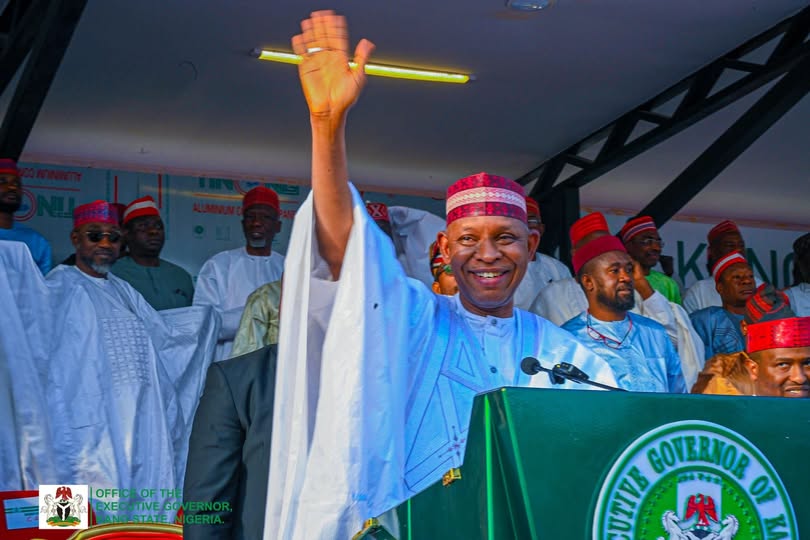The Red Cap Revival: Abba Kabir Yusuf and the Reawakening of Kwankwasiyya in Kano

BY Hassan Sani Tukur
In the storied political landscape of Kano State, where ideology often intersects with identity, Governor Abba K Yusuf has emerged not merely as a successor to power but as a steward of a legacy deeply etched into the conscience of the people. His rise in 2023 under the New Nigeria Peoples Party (NNPP) was not a fluke of electoral arithmetic—it was a return to a political philosophy that had once redefined governance in Northern Nigeria. That philosophy, Kwankwasiyya, birthed by the visionary Sen. Rabiu Musa Kwankwaso, is more than a movement; it is a moral compass that insists governance must serve the masses, not the elite. Governor Abba, fondly called Abba Gida Gida by his people, has not only pledged allegiance to this creed but has woven it into the very fabric of his administration.
One might ask: Where was Abba Kabir Yusuf before 2018, when he emerged as the PDP’s gubernatorial candidate for Kano State in the 2019 elections? The answer lies in a transformative chapter of Kano’s history. He was the visionary technical lead who orchestrated the state’s infrastructural renaissance between 2011 and 2015.
As the Commissioner for Works, Housing, and Transport under Governor Rabiu Musa Kwankwaso, he spearheaded the implementation of what is now widely recognized as the blueprint for modern Kano. His tenure was marked by the construction of iconic flyovers, expansive underpasses, and a state-of-the-art motor park, alongside an impressive network of urban roads. He didn’t just build infrastructure—he reimagined the city’s landscape.
Abba Gida Gida was instrumental in the development of three entirely new urban settlements: Kwankwasiyya, Amana, and Bandirawo—each a symbol of strategic planning and architectural foresight. He illuminated Kano with a sophisticated network of streetlights and traffic lights that brought long-overdue order and efficiency to the city’s bustling roads.
One of his most ambitious undertakings was the initiation of a multi-billion Naira Independent Hydro Power Project at both Challawa Gorge and Tiga Dams—an audacious move toward energy independence. Under his stewardship, institutions like KAROTA (Kano Road Traffic Agency) and KARMA (Kano Roads Maintenance Agency) were established, further institutionalizing road safety and infrastructure maintenance.
Now, tell me—has any former Commissioner for Works in Kano State matched such a legacy? The answer is unequivocally no. Abba Gida Gida’s accomplishments were not accidental; they were the product of deliberate planning, technical expertise, and a deep understanding of civil engineering. His formative years at the Kano State Water Resources Engineering and Construction Agency (WRECA), followed by his tenure at the Water Board, shaped him profoundly and laid a robust foundation for his pivotal role in reshaping Kano’s infrastructural identity.
There exists no political mentee of Senator Rabiu Musa Kwankwaso who can rival Abba Gida Gida’s remarkable longevity—nearly four decades of unwavering loyalty. Throughout this time, he has never shifted allegiance. He remains one of the very few who began their political journey with Kwankwaso and have stayed steadfastly committed, not only to the man himself but to the broader vision of the Kwankwasiyya State Development Project.
Abba’s 2023 campaign promises, enshrined in the “Our Commitment for Kano” policy document, reflect a deep dedication to movement-styled leadership—a seamless continuation of the developmental trajectory Kwankwaso initiated in 2015, which was subsequently abandoned and neglected under Ganduje’s administration until 2023.
Now, the foreign scholarships are back. Massive infrastructural development has returned. Education has once again taken center stage. Free maternal healthcare is reinstated. Human capital development is thriving. The unjust deductions from workers’ salaries have ceased, and pensioners no longer have to surrender 40% to 50% of their hard-earned gratuities just to be considered for payment.
The Kwankwasiyya model of governance is not only back—it’s being refined and elevated. Under the leadership of Engr. Abba Kabir Yusuf, the vision is being executed with precision, purpose, and passion. Abba is working—and the results are exceeding expectations, going far beyond the promises made.
Kano’s political history is rich with ideological shifts—from the populist fervor of the Second Republic under PRP’s Mallam Aminu Kano, whose mantra of “politics without bitterness” still echoes in the corridors of power, to the transformative Kwankwaso years between 1999–2003 and 2011–2015. It was during Kwankwaso’s second term that the Kwankwasiyya doctrine took full shape: red caps, free education, foreign scholarships, massive infrastructure, and a civil service that worked with dignity. When Abba Gida Gida campaigned in 2019 and 2023, he did not promise novelty—he promised continuity. And in a state where memory is political currency, that promise resonated.
Education, the crown jewel of Kwankwasiyya governance, has received unprecedented attention. Declaring a state of emergency in the sector, AKY allocated over 30% of the state budget to education—surpassing even UNESCO’s benchmark. Free education has returned, not just in name but in substance. School fees have been abolished, uniforms and learning materials provided, and over 6,000 teachers recruited. The foreign scholarship scheme, which once sent thousands of Kano indigenes to study in Malaysia, Ukraine, India, and Egypt under Kwankwaso, has been revived. In 2024 alone, 1,001 postgraduate students were sent abroad, with automatic employment promised upon their return. This is not nostalgia—it is strategic investment. As the NNPP’s presidential slogan declared, “Education! Education!! Education!!!”
Today, the Kwankwasiyya and Amana City housing estates, once abandoned and desecrated by political reversal, have been reclaimed. The original master plan has been restored, illegal structures being removed, and the Governor’s Lodge renovated—not as a symbol of power, but as a symbol of restoration.
Healthcare, often the neglected pillar of governance, has seen a quiet revolution. General hospitals across the state have been renovated and equipped with modern tools, drugs, and consumables. Health workers have been recruited en masse, especially in rural areas where access was previously a luxury. The Hausa adage “Lafiya uwar jiki”—health is the mother of the body—has found new meaning in Yusuf’s policies. His approach is reminiscent of the late President Umaru Musa Yar’Adua’s quiet but firm commitment to public service: deliberate, unflashy, but deeply impactful.
Agriculture, the backbone of Kano’s economy, has been reimagined. Irrigation systems are being overhauled, modern technology introduced for crop production, and access to affordable fertilizer ensured. AKY’s administration has begun developing agricultural value chains to ensure farmers benefit not just from harvests but from processing and distribution.
Empowerment programs for youth and women, once the pride of the Kwankwaso era, have been reintroduced. The 26 vocational training institutes and the garment industry established between 2011–2015 have been reopened, offering skills and dignity to thousands. Monthly empowerment initiatives have created new entrepreneurs, reducing unemployment and restoring hope.
Infrastructure development has returned to the front burner. Roads, schools, and hospitals are being built and rehabilitated. Over ₦69 billion has been approved for transformative projects, including the completion of abandoned flyovers and the expansion of urban renewal programs. These are not just concrete and steel—they are the arteries of a modern Kano.
Governor Abba Kabir Yusuf’s leadership is not defined by rhetoric but by results. His loyalty to Kwankwasiyya is not performative—it is principled. In a state where political loyalty often shifts with the wind, Abba Gida Gida has remained anchored. And the people of Kano, ever discerning, have responded with affection. They see in him not just a governor, but a guardian of their hopes. As the Hausa say, “Mai gaskiya baya jin tsoro”—the honest man fears nothing. Perhaps that is why, as 2027 approaches, the red caps are not just worn—they are worn with pride.
Nothing disrupts Governor Abba’s focus. The same unwavering resolve that sustained him as Personal Assistant, Special Assistant, and Principal Private Secretary to Senator Rabiu Musa Kwankwaso—roles among the most demanding in public service—is the very resolve that carried His Excellency through the unjust and, quite frankly, shameful attempt to rob him of his mandate. By the grace of Allah (SWT), those efforts failed. Even after that, further attempts were made to question and ridicule his constitutional authority as the Executive Governor of Kano State.
Yet, nothing distracts him. He remains steadfast, focused, and fully committed to delivering on his mandate. Even when supporters chant “Abba Go Again,” he responds with calm conviction: “The time for politics will come. For now—#ABBAISWORKING.”
Hassan Sani Tukur
SSA New Media



First impressions of hhwson are good! The layout is nice and easy to navigate. Let’s see if the games are just as good! Give it a whirl: hhwson
Hey, I’ve been spinning the reels at Slotspalace10 lately and, I gotta say, it’s pretty decent! The game selection is solid and I even snagged a little win last week. Definitely worth checking out if you’re looking to try your luck. Check them out here slotspalace10.